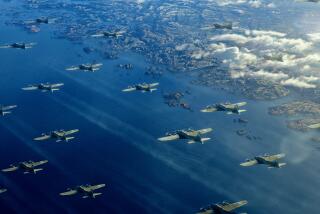Documentary : Storming the Beach--and Meeting the Press : The Marines’ first engagement in Somalia was with the media. Fortunately, the only casualties were dignity, decorum and nerves.
- Share via
MOGADISHU, Somalia — It was just after 3 a.m. last Wednesday. The moon was full, the air balmy, the surf calm. And we were relaxing on the beach of a quiet little cove adjacent to Mogadishu’s seafront international airport.
We were waiting for the U.S. Marines to land in Somalia.
It did seem a bit strange, even at the time. But the operation was anything but a secret. The only surprise came many hours later, when the scene that was about to unfold in the sleepy little cove that the Marines called Green Beach became the hottest new topic in America’s raging military-versus-press debate.
This was, after all, the first time the world press had beaten the Marines to a landing site.
But even that was no accident.
Indeed, there were more than 100 cameramen, photographers and writers on the beachhead on either side of us that pre-dawn morning, blanketing the site of an event we had been invited to cover.
A few hundred yards behind us, just the other side of the strategic runway, the control tower was in safe hands. All three major American TV networks had long since taken control of Mogadishu International’s entire terminal building, plastering the roof and tower with satellite equipment and makeshift studios for their anchormen, who were broadcasting live through the night.
And hours before, just after midnight, a CBS-TV crew that had been permitted by the Pakistani U.N. forces controlling the airport for many weeks to camp out on the beach with night-vision scopes actually had filmed the arrival of the Navy’s super-secret Seal frogmen, as well as an advance reconnaissance team of U.S. Marines. All of it was broadcast live on national television back home.
It was about an hour before the full landing force was scheduled to arrive that a Marine captain startled everyone by suddenly appearing behind us on the sand dune and shouting over the rolling surf.
“This is not an interview. It’s a security briefing,” the captain said, as the dozens of television cameras--which already had recorded most of his team members digging into their “secret” bunkers and incomprehensibly speaking to one another with hand signals--flipped on their lights and rolled tape.
The Marine officer informed the press corps that his commander, Marine Col. Greg Newbold on board the Tripoli offshore, had radioed him to say “he is very concerned about your safety here on the beach.”
“Please, take this time now,” the captain continued as the press gathered round. “He’s given you ample time to pick your things up and get away from this beach.”
When the amphibious assault vehicles start charging out of the surf in an hour or so, “it’s not going to be a pretty sight down here with this beach strung with reporters,” he said. “We don’t want to see anyone injured. I promise you, it’s gonna be a mess if you all stay here. This is literally a three-ring circus here on this beach right now. None of us anticipated it.”
The captain then disappeared behind the dune, leaving his audience in its forward position, astonished and confused.
U.S. sources, in briefings and interviews on previous days, had tipped the entire press corps to the timing of the Marine assault. They had suggested we camp out on the beach that night to record the beginning of this humanitarian mission--it was, in the parlance of today’s journalism, a classic “photo opportunity.”
Now, in the final moments before the climax of this historic drama, the press was suddenly uninvited.
And within the hour, the reason appeared clear.
Scores of camera crews scurried purposefully out of the way of careening amphibious tanks at the last possible moment. They chased the armored vehicles through the dunes to film more close-ups, and then dove for cover as the machines spun onto the runway.
It was, presumably, the first time in military history that a Marine in an assault force had to shout, “Get out of the way! Get out of the way!” as he swerved to avoid wading and charging cameramen.
The Green Beach media may well have been a nuisance for the arriving Marines that night, but there was never a question of breaching security.
The city the Marines were landing in that morning had long since been occupied by the world press--the same press corps that, as the rest of Mogadishu slept soundly, now occupied the strategic beachfront.
And yet, a young Marine lieutenant, Mike Aubut of San Clemente, who was among the first to hit the beachheads, was so uninformed about the situation on the ground that he later recalled: “The first thing I saw were a couple of flashes. I thought, ‘Oh no.’ But then I saw they were just cameras.”
Within minutes of hitting Mogadishu’s beachheads, one unit of jazzed-up Marines in the initial assault team, charged with securing the airport, arrested six Somali employees of the United Nations’ security force there. They treated their captives so roughly that it infuriated the Pakistani brigadier in charge of the U.N. force. “Where the (expletive deleted) is your commander?” he screamed at one Marine.
The Marines disregarded him. “Lie down! Spread your arms,” they shouted at their prisoners, who understood not a word of English.
For all the misunderstandings the night the press corps met the Marine Corps on a sleepy little beach in Mogadishu, there was little permanent damage. The Somali airport employees were released by the Pakistani brigadier. There was not a single casualty among the Marines or the press. And the capital city of Somalia remains in anarchy.
More to Read
Sign up for Essential California
The most important California stories and recommendations in your inbox every morning.
You may occasionally receive promotional content from the Los Angeles Times.













